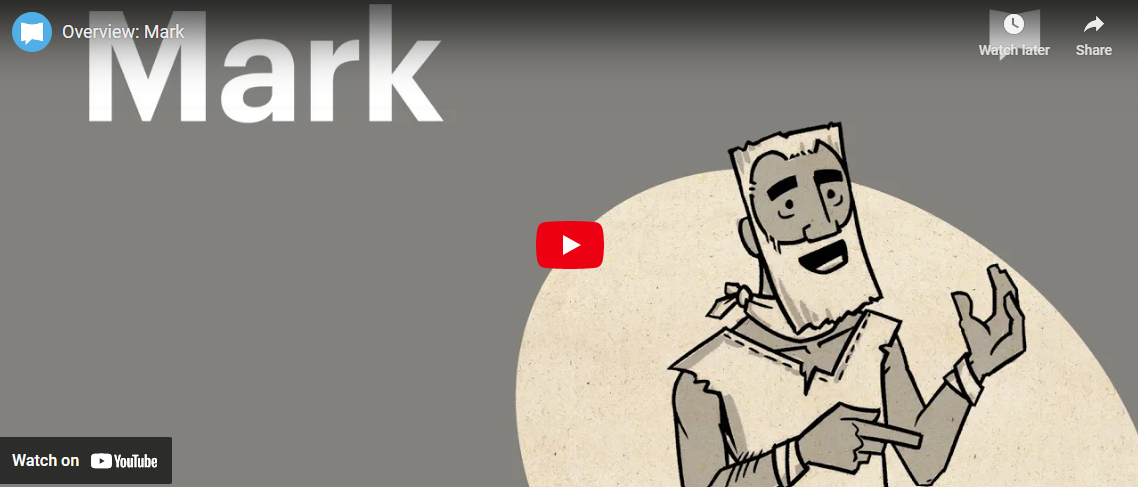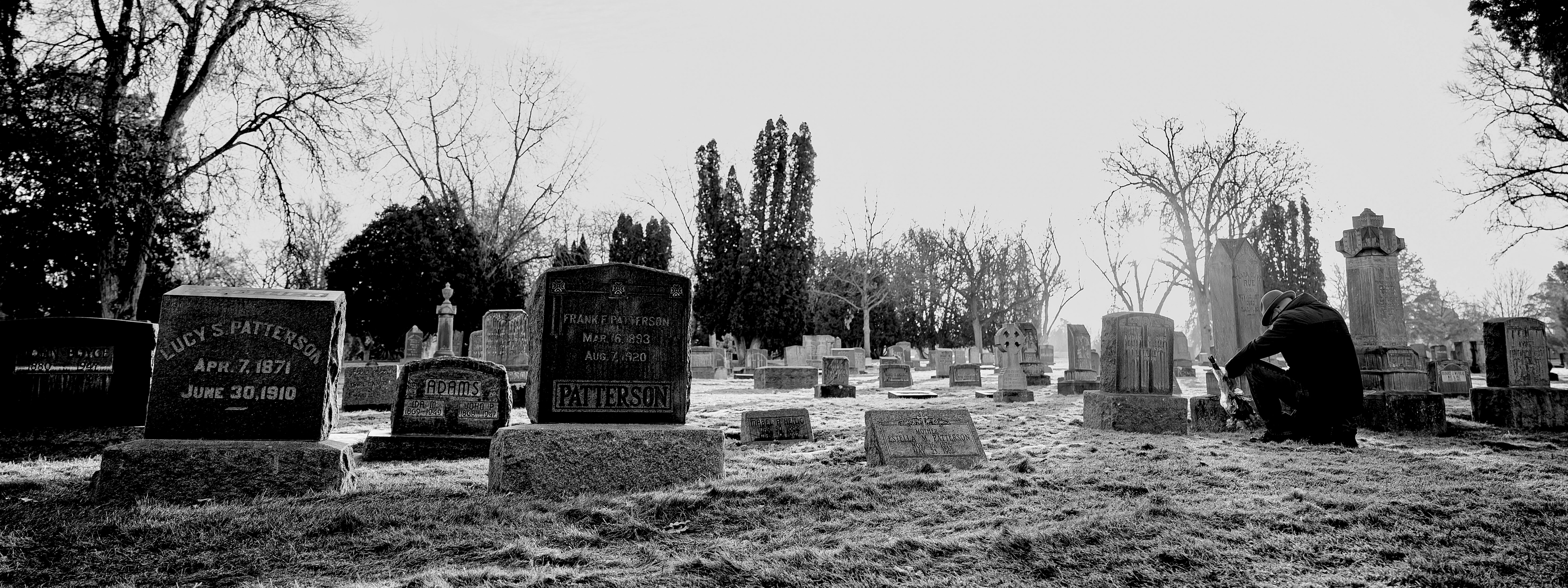Start Here
There was nothing quite like Mark’s Gospel before he wrote it. It was a new form of writing he invented for the sake of his message; a message he describes as ‘good news’.
At its heart, his message was an announcement – a proclamation – about the arrival of someone who, Mark believes, would change everything. Mark’s excitement about his message is infectious. His style is fresh, vivid and breathless. The episodes come in rapid succession like snapshots that together begin to build a picture. From the very beginning he draws us in, telling his story as you would tell a secret.
And as he draws us in to his story, full of mystery and puzzles, many have found – to their surprise – that they become, somehow, a part of it. They see Jesus challenge traditions and expectations, and find their own beliefs and priorities shaken. They see Jesus meet people in the midst of their despair and glimpse new hope for themselves and the world. And as Mark gradually uncovers the story of Jesus, they find their own hearts being uncovered and laid bare.
Mark’s story is, in many ways, deeply unsettling. It shows us new depths of darkness and blindness, new capacities for failure, new needs we are reluctant to admit to. But through it all Mark shows that Jesus is for people just like us. He shows us one who, like no one else, can open our eyes, dispel our darkness and bring forgiveness, healing and life.
Mark thinks it’s good news. Read his account and decide for yourself.
See for yourself
Below are five simple questions to help you consider what you’re reading in any part of this book. Conveniently, the main concept of each question begins with the letter ‘R’. So we refer to these questions with the very original term, “The 5R’s’.
Retell
Retell the narrative (and recap what’s come before).
Note anything that’s unclear or confusing.
React
How are people reacting to Jesus?
Reveal
What is revealed about Jesus (and those meeting him) through words and actions?
Reason
What reason might Mark have for including this event?
Respond
What does Mark teach us about how to respond to Jesus?
What to expect
What’s the most important piece of news you’ve ever received? Did it change your thinking? Your behaviour? Or did you just carry on as normal?
In this first chapter of Mark, we read how different people hear about Jesus or hear from Jesus himself, and the different reactions from their encounters.
What do you think your reaction would be if you were there at the time? What’s your reaction now upon reading this chapter?
The 5Rs: Retell, React, Reveal, Reason, Respond
Mark 1:14-39
Jesus announces the good news
14 After John was put in prison, Jesus went into Galilee, proclaiming the good news of God. 15 ‘The time has come,’ he said. ‘The kingdom of God has come near. Repent and believe the good news!’
Jesus calls his first disciples
16 As Jesus walked beside the Sea of Galilee, he saw Simon and his brother Andrew casting a net into the lake, for they were fishermen. 17 ‘Come, follow me,’ Jesus said, ‘and I will send you out to fish for people.’ 18 At once they left their nets and followed him.
19 When he had gone a little farther, he saw James son of Zebedee and his brother John in a boat, preparing their nets. 20 Without delay he called them, and they left their father Zebedee in the boat with the hired men and followed him.
Jesus drives out an impure spirit
21 They went to Capernaum, and when the Sabbath came, Jesus went into the synagogue and began to teach. 22 The people were amazed at his teaching, because he taught them as one who had authority, not as the teachers of the law. 23 Just then a man in their synagogue who was possessed by an impure spirit cried out, 24 ‘What do you want with us, Jesus of Nazareth? Have you come to destroy us? I know who you are – the Holy One of God!’
25 ‘Be quiet!’ said Jesus sternly. ‘Come out of him!’ 26 The impure spirit shook the man violently and came out of him with a shriek.
27 The people were all so amazed that they asked each other, ‘What is this? A new teaching – and with authority! He even gives orders to impure spirits and they obey him.’ 28 News about him spread quickly over the whole region of Galilee.
Jesus heals many
29 As soon as they left the synagogue, they went with James and John to the home of Simon and Andrew. 30 Simon’s mother-in-law was in bed with a fever, and they immediately told Jesus about her. 31 So he went to her, took her hand and helped her up. The fever left her and she began to wait on them.
32 That evening after sunset the people brought to Jesus all who were ill and demon-possessed. 33 The whole town gathered at the door, 34 and Jesus healed many who had various diseases. He also drove out many demons, but he would not let the demons speak because they knew who he was.
Jesus prays in a solitary place
35 Very early in the morning, while it was still dark, Jesus got up, left the house and went off to a solitary place, where he prayed. 36 Simon and his companions went to look for him, 37 and when they found him, they exclaimed: ‘Everyone is looking for you!’
38 Jesus replied, ‘Let us go somewhere else – to the nearby villages – so that I can preach there also. That is why I have come.’ 39 So he travelled throughout Galilee, preaching in their synagogues and driving out demons.
What to expect
By now, the news of Jesus and his power to heal has travelled and people are bringing their sick friends and family to Jesus, just hoping he might heal them. People don’t doubt he could heal – otherwise they wouldn’t be bringing the sick to him!
In this passage, Jesus does something unexpected. Can you identify that and why is it a big deal?
The 5Rs: Retell, React, Reveal, Reason, Respond
Mark 1:40-2:12
Jesus heals a man with leprosy
40 A man with leprosy came to him and begged him on his knees, ‘If you are willing, you can make me clean.’
41 Jesus was indignant. He reached out his hand and touched the man. ‘I am willing,’ he said. ‘Be clean!’ 42 Immediately the leprosy left him and he was cleansed.
43 Jesus sent him away at once with a strong warning: 44 ‘See that you don’t tell this to anyone. But go, show yourself to the priest and offer the sacrifices that Moses commanded for your cleansing, as a testimony to them.’ 45 Instead he went out and began to talk freely, spreading the news. As a result, Jesus could no longer enter a town openly but stayed outside in lonely places. Yet the people still came to him from everywhere.
Jesus forgives and heals a paralysed man
2 A few days later, when Jesus again entered Capernaum, the people heard that he had come home. 2 They gathered in such large numbers that there was no room left, not even outside the door, and he preached the word to them. 3 Some men came, bringing to him a paralysed man, carried by four of them. 4 Since they could not get him to Jesus because of the crowd, they made an opening in the roof above Jesus by digging through it and then lowered the mat the man was lying on. 5 When Jesus saw their faith, he said to the paralysed man, ‘Son, your sins are forgiven.’
6 Now some teachers of the law were sitting there, thinking to themselves, 7 ‘Why does this fellow talk like that? He’s blaspheming! Who can forgive sins but God alone?’
8 Immediately Jesus knew in his spirit that this was what they were thinking in their hearts, and he said to them, ‘Why are you thinking these things? 9 Which is easier: to say to this paralysed man, “Your sins are forgiven,” or to say, “Get up, take your mat and walk”? 10 But I want you to know that the Son of Man has authority on earth to forgive sins.’ So he said to the man, 11 ‘I tell you, get up, take your mat and go home.’ 12 He got up, took his mat and walked out in full view of them all. This amazed everyone and they praised God, saying, ‘We have never seen anything like this!’
What to expect
Jesus continues to heal the sick. He demonstrates his willingness and power to do so. In the previous passage we read about the healing of the leper and the paralysed man getting up from his mat. But is this as far as it goes? Is this all there is to Jesus?
We’ve already read about Jesus forgiving sins. Jesus now moves subtly (or maybe not so subtly!) to challenging people’s faith. What if someone is more than just sick? What if they are dead? Do people trust Jesus can do more than just heal the sick?
The 5Rs: Retell, React, Reveal, Reason, Respond
Mark 5:21-43
Jesus raises a dead girl and heals a sick woman
21 When Jesus had again crossed over by boat to the other side of the lake, a large crowd gathered round him while he was by the lake. 22 Then one of the synagogue leaders, named Jairus, came, and when he saw Jesus, he fell at his feet. 23 He pleaded earnestly with him, ‘My little daughter is dying. Please come and put your hands on her so that she will be healed and live.’ 24 So Jesus went with him.
A large crowd followed and pressed round him. 25 And a woman was there who had been subject to bleeding for twelve years. 26 She had suffered a great deal under the care of many doctors and had spent all she had, yet instead of getting better she grew worse. 27 When she heard about Jesus, she came up behind him in the crowd and touched his cloak, 28 because she thought, ‘If I just touch his clothes, I will be healed.’ 29 Immediately her bleeding stopped and she felt in her body that she was freed from her suffering.
30 At once Jesus realised that power had gone out from him. He turned round in the crowd and asked, ‘Who touched my clothes?’
31 ‘You see the people crowding against you,’ his disciples answered, ‘and yet you can ask, “Who touched me?”‘
32 But Jesus kept looking around to see who had done it. 33 Then the woman, knowing what had happened to her, came and fell at his feet and, trembling with fear, told him the whole truth. 34 He said to her, ‘Daughter, your faith has healed you. Go in peace and be freed from your suffering.’
35 While Jesus was still speaking, some people came from the house of Jairus, the synagogue leader. ‘Your daughter is dead,’ they said. ‘Why bother the teacher anymore?’
36 Overhearing what they said, Jesus told him, ‘Don’t be afraid; just believe.’
37 He did not let anyone follow him except Peter, James and John the brother of James. 38 When they came to the home of the synagogue leader, Jesus saw a commotion, with people crying and wailing loudly. 39 He went in and said to them, ‘Why all this commotion and wailing? The child is not dead but asleep.’ 40 But they laughed at him.
After he put them all out, he took the child’s father and mother and the disciples who were with him, and went in where the child was. 41 He took her by the hand and said to her, ‘Talitha koum!’ (which means ‘Little girl, I say to you, get up!’). 42 Immediately the girl stood up and began to walk around (she was twelve years old). At this they were completely astonished. 43 He gave strict orders not to let anyone know about this, and told them to give her something to eat.
What to expect
Who is Jesus?
We’ve now read in Mark the many reactions people have when they encounter Jesus. Some are thankful to be healed (Mark 1:40-45). Some are amazed by his teaching (Mark 1:21-22). Some are angry because he claims to be God (Mark 2:6-7). The disciples were there right from the start, so it’s right for Jesus to ask them “Who do people say I am?”.
Who you you say Jesus is?
The 5Rs: Retell, React, Reveal, Reason, Respond
Mark 8:27-9:1
Peter declares that Jesus is the Messiah
27 Jesus and his disciples went on to the villages around Caesarea Philippi. On the way he asked them, ‘Who do people say I am?’
28 They replied, ‘Some say John the Baptist; others say Elijah; and still others, one of the prophets.’
29 ‘But what about you?’ he asked. ‘Who do you say I am?’
Peter answered, ‘You are the Messiah.’
30 Jesus warned them not to tell anyone about him.
Jesus predicts his death
31 He then began to teach them that the Son of Man must suffer many things and be rejected by the elders, the chief priests and the teachers of the law, and that he must be killed and after three days rise again. 32 He spoke plainly about this, and Peter took him aside and began to rebuke him.
33 But when Jesus turned and looked at his disciples, he rebuked Peter. ‘Get behind me, Satan!’ he said. ‘You do not have in mind the concerns of God, but merely human concerns.’
The way of the cross
34 Then he called the crowd to him along with his disciples and said: ‘Whoever wants to be my disciple must deny themselves and take up their cross and follow me. 35 For whoever wants to save their life will lose it, but whoever loses their life for me and for the gospel will save it. 36 What good is it for someone to gain the whole world, yet forfeit their soul? 37 Or what can anyone give in exchange for their soul? 38 If anyone is ashamed of me and my words in this adulterous and sinful generation, the Son of Man will be ashamed of them when he comes in his Father’s glory with the holy angels.’
9 And he said to them, ‘Truly I tell you, some who are standing here will not taste death before they see that the kingdom of God has come with power.’
What to expect
So far in Mark, Jesus has been healing the sick, overpowering demons, teaching people, even upsetting the establishment! If Mark is a novel, you’d expect things to keep getting bigger, leading to a grand finale for the all-conquering hero. But in the last passage, we learn that no sooner had Peter confessed to Jesus, ‘You are the Messiah’ (God’s chosen king), Jesus starts to talk about his own death.
What’s going on? That can’t be how it goes!
Heroes are meant to conquer, maybe even face an heroic death. But to be rejected and to die in such an undignified way, as Jesus predicts, just doesn’t fit the plot. Unless it’s time we turn our thinking upside down and work out why such a death is necessary.
The 5Rs: Retell, React, Reveal, Reason, Respond
Mark 10:32-52
Jesus predicts his death a third time
32 They were on their way up to Jerusalem, with Jesus leading the way, and the disciples were astonished, while those who followed were afraid. Again he took the Twelve aside and told them what was going to happen to him. 33 ‘We are going up to Jerusalem,’ he said, ‘and the Son of Man will be delivered over to the chief priests and the teachers of the law. They will condemn him to death and will hand him over to the Gentiles, 34 who will mock him and spit on him, flog him and kill him. Three days later he will rise.’
The request of James and John
35 Then James and John, the sons of Zebedee, came to him. ‘Teacher,’ they said, ‘we want you to do for us whatever we ask.’
36 ‘What do you want me to do for you?’ he asked.
37 They replied, ‘Let one of us sit at your right and the other at your left in your glory.’
38 ‘You don’t know what you are asking,’ Jesus said. ‘Can you drink the cup I drink or be baptised with the baptism I am baptised with?’
39 ‘We can,’ they answered.
Jesus said to them, ‘You will drink the cup I drink and be baptised with the baptism I am baptised with, 40 but to sit at my right or left is not for me to grant. These places belong to those for whom they have been prepared.’
41 When the ten heard about this, they became indignant with James and John. 42 Jesus called them together and said, ‘You know that those who are regarded as rulers of the Gentiles lord it over them, and their high officials exercise authority over them. 43 Not so with you. Instead, whoever wants to become great among you must be your servant, 44 and whoever wants to be first must be slave of all. 45 For even the Son of Man did not come to be served, but to serve, and to give his life as a ransom for many.’
Blind Bartimaeus receives his sight
46 Then they came to Jericho. As Jesus and his disciples, together with a large crowd, were leaving the city, a blind man, Bartimaeus (which means ‘son of Timaeus’), was sitting by the roadside begging. 47 When he heard that it was Jesus of Nazareth, he began to shout, ‘Jesus, Son of David, have mercy on me!’
48 Many rebuked him and told him to be quiet, but he shouted all the more, ‘Son of David, have mercy on me!’
49 Jesus stopped and said, ‘Call him.’
So they called to the blind man, ‘Cheer up! On your feet! He’s calling you.’ 50 Throwing his cloak aside, he jumped to his feet and came to Jesus.
51 ‘What do you want me to do for you?’ Jesus asked him.
The blind man said, ‘Rabbi, I want to see.’
52 ‘Go,’ said Jesus, ‘your faith has healed you.’ Immediately he received his sight and followed Jesus along the road.
What to expect
If you knew something terrible was going to happen to you, would you ask God to try to change it?
In this prayer Jesus reveals the meaning of his death, and why it’s so awful to contemplate. But then he prays something significant. How does this help us to admire Jesus even more?
The 5Rs: Retell, React, Reveal, Reason, Respond
Mark 14:32-42
Gethsemane
32 They went to a place called Gethsemane, and Jesus said to his disciples, ‘Sit here while I pray.’ 33 He took Peter, James and John along with him, and he began to be deeply distressed and troubled. 34 ‘My soul is overwhelmed with sorrow to the point of death,’ he said to them. ‘Stay here and keep watch.’
35 Going a little farther, he fell to the ground and prayed that if possible the hour might pass from him. 36 ‘Abba, Father,’ he said, ‘everything is possible for you. Take this cup from me. Yet not what I will, but what you will.’
37 Then he returned to his disciples and found them sleeping. ‘Simon,’ he said to Peter, ‘are you asleep? Couldn’t you keep watch for one hour? 38 Watch and pray so that you will not fall into temptation. The spirit is willing, but the flesh is weak.’
39 Once more he went away and prayed the same thing. 40 When he came back, he again found them sleeping, because their eyes were heavy. They did not know what to say to him.
41 Returning the third time, he said to them, ‘Are you still sleeping and resting? Enough! The hour has come. Look, the Son of Man is delivered into the hands of sinners. 42 Rise! Let us go! Here comes my betrayer!’
What to expect
Jesus has become quite a figure in Jerusalem. His healing powers and his authoritative teachings have earned him a legion of followers. The Jewish leaders of the time are not happy with him, even threatened by his existence. Just as Jesus predicts, they will try and have him killed. But the lies they have don’t line up and they’re forced to accuse him of blasphemy.
The 5Rs: Retell, React, Reveal, Reason, Respond
Mark 14:53-72
Jesus before the Sanhedrin
53 They took Jesus to the high priest, and all the chief priests, the elders and the teachers of the law came together. 54 Peter followed him at a distance, right into the courtyard of the high priest. There he sat with the guards and warmed himself at the fire.
55 The chief priests and the whole Sanhedrin were looking for evidence against Jesus so that they could put him to death, but they did not find any. 56 Many testified falsely against him, but their statements did not agree.
57 Then some stood up and gave this false testimony against him: 58 ‘We heard him say, “I will destroy this temple made with human hands and in three days will build another, not made with hands.”‘ 59 Yet even then their testimony did not agree.
60 Then the high priest stood up before them and asked Jesus, ‘Are you not going to answer? What is this testimony that these men are bringing against you?’ 61 But Jesus remained silent and gave no answer.
Again the high priest asked him, ‘Are you the Messiah, the Son of the Blessed One?’
62 ‘I am,’ said Jesus. ‘And you will see the Son of Man sitting at the right hand of the Mighty One and coming on the clouds of heaven.’
63 The high priest tore his clothes. ‘Why do we need any more witnesses?’ he asked. 64 ‘You have heard the blasphemy. What do you think?’
They all condemned him as worthy of death. 65 Then some began to spit at him; they blindfolded him, struck him with their fists, and said, ‘Prophesy!’ And the guards took him and beat him.
Peter disowns Jesus
66 While Peter was below in the courtyard, one of the servant-girls of the high priest came by. 67 When she saw Peter warming himself, she looked closely at him.
‘You also were with that Nazarene, Jesus,’ she said.
68 But he denied it. ‘I don’t know or understand what you’re talking about,’ he said, and went out into the entrance.
69 When the servant-girl saw him there, she said again to those standing round them, ‘This fellow is one of them.’ 70 Again he denied it.
After a little while, those standing near said to Peter, ‘Surely you are one of them, for you are a Galilean.’
71 He began to call down curses, and he swore to them, ‘I don’t know this man you’re talking about.’
72 Immediately the cock crowed the second time. Then Peter remembered the word Jesus had spoken to him: ‘Before the cock crows twice you will disown me three times.’ And he broke down and wept.
What to expect
The moment has finally come. Jesus is to be crucified. Jesus has been predicting this for quite a while (over the whole second half of the book of Mark!). We know it happens. What may surprise us is the way people react and respond to Jesus while he’s being crucified. Look carefully at what people are saying and doing. Beyond their sarcasm and mockery lies the truth.
Look for what is perhaps the most surprising admission from an unlikely person in the passage.
The 5Rs: Retell, React, Reveal, Reason, Respond
Mark 15:16-41
The soldiers mock Jesus
16 The soldiers led Jesus away into the palace (that is, the Praetorium) and called together the whole company of soldiers. 17 They put a purple robe on him, then twisted together a crown of thorns and set it on him. 18 And they began to call out to him, ‘Hail, king of the Jews!’ 19 Again and again they struck him on the head with a staff and spat on him. Falling on their knees, they paid homage to him. 20 And when they had mocked him, they took off the purple robe and put his own clothes on him. Then they led him out to crucify him.
The crucifixion of Jesus
21 A certain man from Cyrene, Simon, the father of Alexander and Rufus, was passing by on his way in from the country, and they forced him to carry the cross. 22 They brought Jesus to the place called Golgotha (which means ‘the place of the skull’). 23 Then they offered him wine mixed with myrrh, but he did not take it. 24 And they crucified him. Dividing up his clothes, they cast lots to see what each would get.
25 It was nine in the morning when they crucified him. 26 The written notice of the charge against him read: the king of the jews.
27 They crucified two rebels with him, one on his right and one on his left. 29 Those who passed by hurled insults at him, shaking their heads and saying, ‘So! You who are going to destroy the temple and build it in three days, 30 come down from the cross and save yourself!’ 31 In the same way the chief priests and the teachers of the law mocked him among themselves. ‘He saved others,’ they said, ‘but he can’t save himself! 32 Let this Messiah, this king of Israel, come down now from the cross, that we may see and believe.’ Those crucified with him also heaped insults on him.
The death of Jesus
33 At noon, darkness came over the whole land until three in the afternoon. 34 And at three in the afternoon Jesus cried out in a loud voice, ‘Eloi, Eloi, lema sabachthani?’ (which means ‘My God, my God, why have you forsaken me?’).
35 When some of those standing near heard this, they said, ‘Listen, he’s calling Elijah.’
36 Someone ran, filled a sponge with wine vinegar, put it on a staff, and offered it to Jesus to drink. ‘Now leave him alone. Let’s see if Elijah comes to take him down,’ he said.
37 With a loud cry, Jesus breathed his last.
38 The curtain of the temple was torn in two from top to bottom. 39 And when the centurion, who stood there in front of Jesus, saw how he died, he said, ‘Surely this man was the Son of God!’
40 Some women were watching from a distance. Among them were Mary Magdalene, Mary the mother of James the younger and of Joseph, and Salome. 41 In Galilee these women had followed him and cared for his needs. Many other women who had come up with him to Jerusalem were also there.
What to expect
Jesus dies. The story ends. Cue the credits. But that is NOT the end of Mark’s account of Jesus.
In this passage we also read that a certain Joseph of Arimathea takes the body down from the cross and places it in a tomb, and then closes the tomb up. The story could end right there, a bit anti-climactic but at least the loose ends are tied up.
Mark’s account ends with a surprising new twist, one that’s perhaps even hard to believe.
The 5Rs: Retell, React, Reveal, Reason, Respond
Mark 15:42-16:8
42 It was Preparation Day (that is, the day before the Sabbath). So as evening approached, 43 Joseph of Arimathea, a prominent member of the Council, who was himself waiting for the kingdom of God, went boldly to Pilate and asked for Jesus’ body. 44 Pilate was surprised to hear that he was already dead. Summoning the centurion, he asked him if Jesus had already died. 45 When he learned from the centurion that it was so, he gave the body to Joseph. 46 So Joseph bought some linen cloth, took down the body, wrapped it in the linen, and placed it in a tomb cut out of rock. Then he rolled a stone against the entrance of the tomb. 47 Mary Magdalene and Mary the mother of Joseph saw where he was laid.
Jesus has risen
16 When the Sabbath was over, Mary Magdalene, Mary the mother of James, and Salome bought spices so that they might go to anoint Jesus’ body. 2 Very early on the first day of the week, just after sunrise, they were on their way to the tomb 3 and they asked each other, ‘Who will roll the stone away from the entrance of the tomb?’
4 But when they looked up, they saw that the stone, which was very large, had been rolled away. 5 As they entered the tomb, they saw a young man dressed in a white robe sitting on the right side, and they were alarmed.
6 ‘Don’t be alarmed,’ he said. ‘You are looking for Jesus the Nazarene, who was crucified. He has risen! He is not here. See the place where they laid him. 7 But go, tell his disciples and Peter, “He is going ahead of you into Galilee. There you will see him, just as he told you.”‘
8 Trembling and bewildered, the women went out and fled from the tomb. They said nothing to anyone, because they were afraid.














